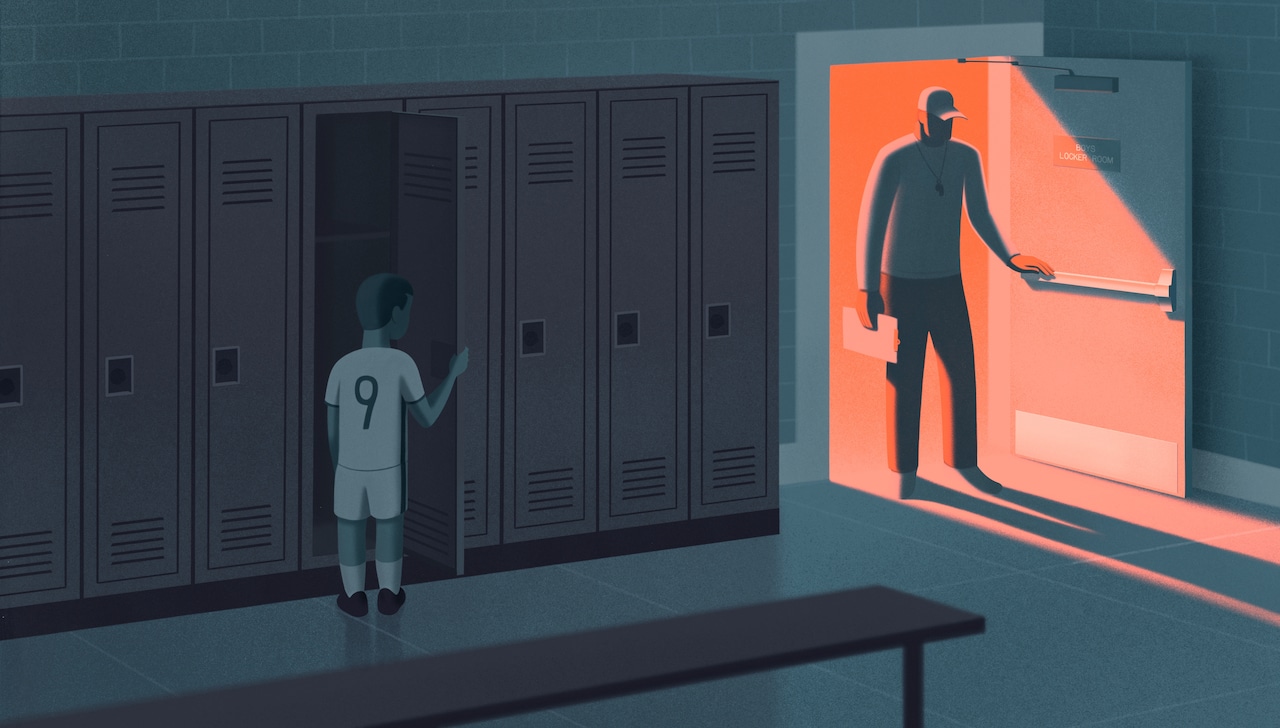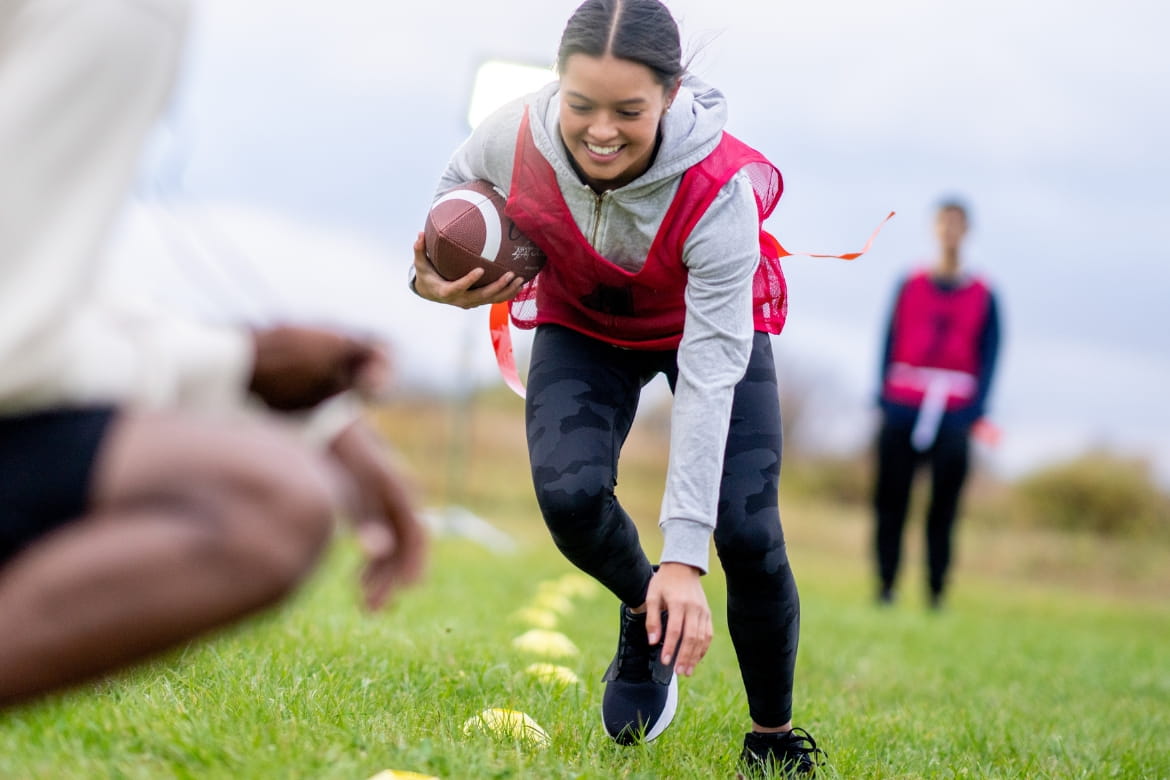Flag football has exploded in popularity — especially among girls and women. From girls’ youth leagues to all-girls high school and collegiate teams, it’s one of the fastest-growing sports in the U.S.
With more schools and recreational leagues offering non-tackle football programs, you may wonder if flag football is a good choice for your daughter.
We talked to Genevieve Lambert, MD, a sports medicine specialist with Banner – University Medicine, to learn more about the sport, its benefits and risks and how to support your child if she decides to play.
What is flag football?
Flag football is a non-contact version of traditional football. Instead of tackling, defensive players pull a flag from the ball carrier’s belt to stop the play.
“This key difference makes it a safer option than traditional football while still allowing for competition, strategy and teamwork,” Dr. Lambert said.
The game is typically played with five or nine players on a shorter, half-field, without heavy protective gear or padding. That said, players often wear mouthguards, cleats and optional soft headgear for added safety.
The benefits of flag football for girls
Sports like flag football offer much more than physical activity. They can build lifelong skills and support a girl’s mental, emotional, and social well-being.
Physical health benefits
Players run, pivot, throw and catch, providing a full-body workout.
“It can increase endurance, agility, coordination and other sport-specific skills,” Dr. Lambert said.
These movements help girls build:
- Cardiovascular fitness
- Muscle strength and tone
- Balance and coordination
- Healthy exercise habits
Being a part of a sport also helps reduce the risk of childhood obesity, type 2 diabetes and other chronic conditions later in life.
Mental and emotional benefits
“Girls and women who play sports tend to have higher self-esteem and experience greater states of well-being than those who don’t,” Dr. Lambert said. “Improved mental health, leadership skills and discipline are some of the key benefits girls get from playing flag football.”
Other benefits include:
- Teamwork and communication skills
- Confidence through skill development
- Stress relief and emotional regulation
- Resilience and perseverance
- Friendship and a sense of belonging
For girls navigating adolescence, sports like flag can be a safe space to express themselves, test their limits and excel.
Is flag football safe for girls?
Compared to tackle football, flag offers a lower risk of serious injury. The chance of traumatic injuries is lower than in tackle football. But that doesn’t mean flag football is injury-free.
“Like any sport, there is still a high risk of extremity, head and neck injuries, even without high-level contact,” Dr. Lambert said.
Dr. Lambert shared that the most common injuries she sees in female flag football players include:
- Knee injuries, such as ACL tears
- Ankle sprains
- Contusions (bruises)
- Concussions
- Neck and facial injuries
Is your daughter ready to play?
So how do you know if your child is ready to try flag football? Dr. Lambert recommends considering her current activity level and interests.
“If they are highly active, like to play team sports and have basic skills like running, throwing and catching, this may be a good sport for them,” she said.
Every child develops at a different pace. What matters most is that your daughter feels excited, comfortable and physically able to participate. A pre-participation sports physical is a good way to check her readiness and screen for any health issues that might affect her safety.
How to keep your daughter safe
As a parent, there’s a lot you can do to support your daughter’s safety and well-being on the field. Dr. Lambert offered several important tips:
- Use a mouthguard: This can protect against dental injuries.
- Wear proper footwear: Supportive, sport-specific shoes like cleats help prevent ankle sprains.
- Stay hydrated: Encourage regular water breaks, especially during warm weather.
- Warm and stretch: A proper warm-up routine can help prevent injuries.
- Look for trained coaches: Ask if coaches are certified and follow safe training practices for youth sports.
Watch for signs of overtraining
Like any sport, flag football can become too much if your child isn’t getting enough rest. Here are some red flags that your child may be overtraining:
- Fatigue
- Mood changes
- Lack of motivation to play
- Decreased performance
- Changes in sleep
- Recurrent injuries or slower recovery time
If you notice any of these signs, it might be time to take a step back and reassess her training schedule.
When to talk to a doctor
Most flag football injuries are mild and respond well to rest, ice and over-the-counter (OTC) pain relief. But some symptoms may signal a more serious issue.
Contact your child’s provider if your daughter has:
- Ongoing pain or swelling that doesn’t improve
- Difficulty walking or using a limb
- Headache, dizziness or confusion after a hit
- Breathing problems during exercise
- Multiple injuries in a short period
At Banner Health, our pediatric care teams and sports medicine specialists support athletes of all ages.
Final thoughts
Flag football can be a fun, healthy and empowering sport for girls. But it’s not one-size-fits-all. Consider your daughter’s interest level, physical abilities, health and social comfort.
Talk about how she feels during practices and games. Stay open and supportive as she explores what she enjoys.
Need a last-minute sports physical? Walk into Banner Urgent Care. We offer quick, convenient sports physicals — even on evenings and weekends. Find a nearby location and check wait times.
Related articles:

























































 BREAKING: NBA MVP Shai Gilgeous-Alexander signs the RICHEST annual salary in league history
BREAKING: NBA MVP Shai Gilgeous-Alexander signs the RICHEST annual salary in league history

